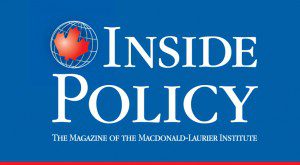 Getting insights from Australian defence policy is a good idea, say Andrew Pickford and Jeffrey Collins for Inside Policy, but beware the perils of “Australidealizing”.
Getting insights from Australian defence policy is a good idea, say Andrew Pickford and Jeffrey Collins for Inside Policy, but beware the perils of “Australidealizing”.
By Andrew Pickford and Jeffrey Collins, March 3, 2016
It is tempting to revere Australia’s defence and security policy.
Matthew Fisher’s recent column in the National Post, Lessons on national defence from Down Under, for example, paints a positive picture of Canada’s Antipodean cousin. While there are certainly aspects of Australia’s approach which could inform Canadian policy makers, it is important to not fall into the trap of “Australidealizing”, a common Canadian affliction which has apparently been exacerbated by the recent release of the Australian Defence White Paper, which includes a plan to spend $195-billion on new equipment through the next decade.
Canadian defence watchers will be made more more jealous by Aussie plans to acquire 12 new diesel electric submarines – likely to be based on the Japanese Soryu class – doubling the existing fleet. The price tag for the acquisition alone is over $50-billion. This by a country which is in many ways a mirror image of Canada; except for climate, accent and 12-million fewer people.
But before Australian security policy becomes a model for Ottawa, it is necessary to take a deep breath and look beneath the apparent bi-partisan and seemingly grown-up approach to defence strategy and spending.
Australian political leaders should have a much more expansive view of defence needs and be willing to invest larger sums for the defence of a continent which is reliant on maritime trading routes.
Australian political leaders are no more visionary than their Canadian counterparts, but they have had to deal with living in a troubled region for a much longer period. This was shaped by the legacy of being a European outpost in Asia. Federation of Australia in 1901 was sped up by the threat of German expansion. The fall of Singapore and the bombing of northern cities by Japan in the Second World War have left an imprint on contemporary strategists. More recently, East Timor’s independence process was a wakeup call, not only in terms of gaps in logistics, but also the potential for confrontation with Indonesia. The effective collapse of Solomon Islands in the early 2000s required a major defence and civilian effort to stabilise the nation. Concerns about a similar scenario in Papua New Guinea keeps defence planners awake at night. And while South China Sea issues are somewhat abstract in Canada, for Australia, this represents a potential flashpoint between its main security partner, the United States, and main economic partner, China.
If anything, Australian political leaders should have a much more expansive view of defence needs and be willing to invest larger sums for the defence of a continent which is reliant on maritime trading routes.
Another problem with Australidealizing is the underlying politics of defence policy. Even the timing of the release of the defence white paper was influenced by a partisan debate about tax on residential property. Broad support is given to high-level strategy, but funding, procurement and defence basing are subject to the same political pressures known to Canadian politicians. Quebec and South Australian premiers would be able to compare notes on how to hold procurement plans to ransom by having underperforming economies and marginal seats. In South Australia’s case this includes the closing of car production plants.
As in Canada, sustaining a viable shipbuilding industry is seen as part-and-parcel of expanding the Royal Australian Navy’s fleet of surface and sub-surface vessels. The emphasis on building domestically – at least in shipbuilding – has seen Australia’s defence procurement process become mired in cost overruns and delays: the air warfare destroyer project is now nearly three years behind schedule and close to $1 billion over budget.
If the past is a guide, there is no way of knowing if any of Canberra’s planned acquisitions will be completed either on time or within in the stated budget. Critics of Canada’s National Shipbuilding Procurement Strategy take note: Australia may have ambitious plans when it comes to its navy but theirs too are imperfect. One of the reasons that the submarines will be procured offshore is the painful experience of the Collins class submarine project which attempted to adapt an overseas design and build it locally.
It should be remembered that this is Australia’s third defence white paper in seven years – each reflecting a change in the Prime Minister’s Office. Defence procurement promises were even used by the now former prime minister, Tony Abbott, to shore up his internal support. Getting insights from Australian defence policy is a good idea, but beware the perils of Australidealizing.
Andrew Pickford is an Australian defence analyst based in Quebec and Jeffrey F. Collins is a defence policy analyst based in Prince Edward Island. They are co-authors of a forthcoming Macdonald-Laurier Institute paper exploring opportunities for Canada-Australia co-operation on polar issues.




